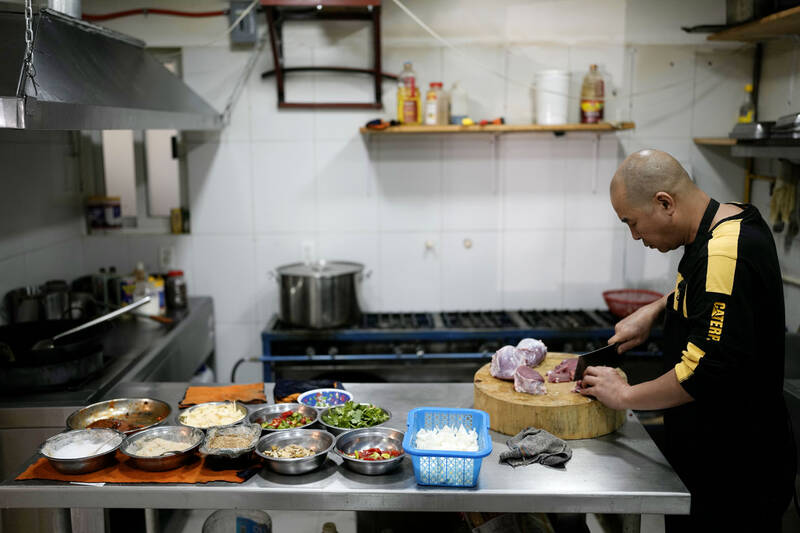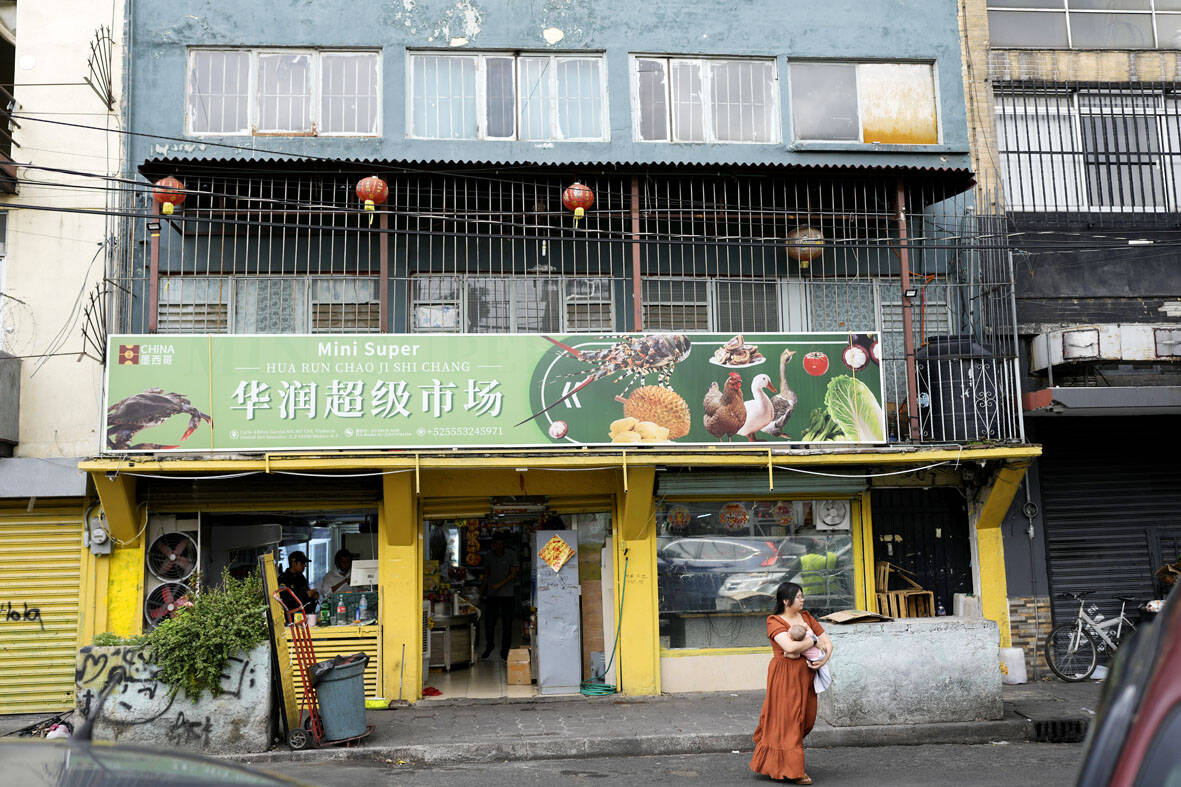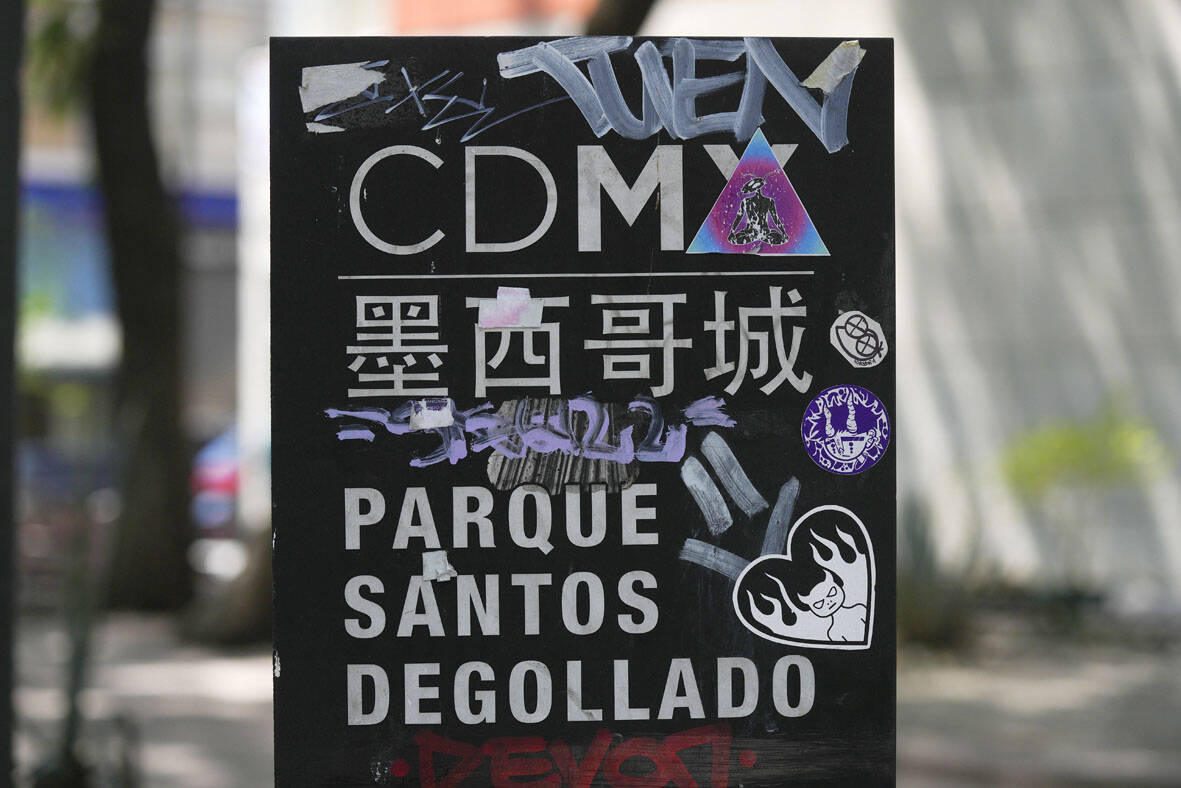Despite her well-paying tech job, Li Daijing didn’t hesitate when her cousin asked for help running a restaurant in Mexico City. She packed up and left China for the Mexican capital last year, with dreams of a new adventure.
The 30-year-old woman from Chengdu, the Sichuan provincial capital, hopes one day to start an online business importing furniture from her home country.
“I want more,” Li said. “I want to be a strong woman. I want independence.”

Photo: AP
Li is among a new wave of Chinese migrants who are leaving their country in search of opportunities, more freedom or better financial prospects at a time when China’s economy has slowed, youth unemployment rates remain high and its relations with the US and its allies have soured.
While the US border patrol arrested tens of thousands of Chinese at the US-Mexico border over the past year, thousands are making the Latin American country their final destination. Many have hopes to start businesses of their own, taking advantage of Mexico’s proximity to the US.
Last year, Mexico’s government issued 5,070 temporary residency visas to Chinese immigrants, twice as many as the previous year — making China third, behind the US and Colombia, as the source of migrants granted the permits.

Photo: AP
DEEP ROOTED DIASPORA
A deep-rooted diaspora that has fostered strong family and business networks over decades makes Mexico appealing for new Chinese arrivals; so does a growing presence of Chinese multinationals in Mexico, which have set up shop to be close to markets in the Americas.
“A lot of Chinese started coming here two years ago — and these people need to eat,” said Duan Fan, owner of Nueve y media, a restaurant in Mexico City’s stylish Roma Sur neighborhood that serves the spicy food of Sichuan, his home province.

Photo: AP
“I opened a Chinese restaurant so that people can come here and eat like they do at home,” he said.
Duan, 27, arrived in Mexico in 2017 to work with an uncle who owns a wholesale business in Tepito, near the capital’s historic center, and was later joined by his parents.
Unlike earlier generations of Chinese who came to northern Mexico from the southern Chinese province of Guangdong, the new arrivals are more likely to come from all over China.
Data from the latest 2020 census by Mexico’s National Institute of Statistics and Geography show that Chinese immigrants are mainly concentrated in Mexico City. A decade ago, the census recorded the largest concentration of Chinese in the northernmost state of Baja California, on the US-Mexico border across from California.
The arrival of Chinese multinationals is leading an influx of “people from eastern China, more educated and with a broader global background,” said Andrei Guerrero, academic coordinator of the Center for China-Baja California Studies.
In a middle-class Mexico City neighborhood, Viaducto-Piedad, near the city’s historic Chinatown, a new Chinese community has been growing since the late 1990s. Chinese immigrants have not only opened businesses, but have created community spaces for religious events and children’s recreation.
Viaducto-Piedad is recognized by the Chinese themselves as Mexico City’s true “Chinatown,” said Monica Cinco, a specialist in Chinese migration and general director of the EDUCA Mexico Foundation.
“When I asked them why, they would tell me because we live here. We have stores for Chinese consumption, beauty shops and restaurants just for Chinese,” she said. “They live there, there is a community and several public schools in the area have a significant Chinese population.”
SEARCHING FOR FREEDOM
In downtown Mexico City, Chinese entrepreneurs have not only opened new wholesale stores but have also taken over dozens of buildings. At times, they have become a source of tension with local businesses and residents, who say the expansion of Chinese-owned enterprises is displacing them.
At a mini-market in a bustling downtown neighborhood selling Chinese products such as dried wood ear mushrooms and vacuum-packed spicy duck wings, 33-year-old Dong Shengli said he moved to Mexico City from Beijing a few months ago to help manage the shop for some friends.
Dong — who has since found a job with a wholesaler importing knockoff designer sneakers and clothing — said he had worked at China’s National Energy Commission, but was persuaded by his friends to come here.
He plans to explore business possibilities in Mexico, but China still has a pull for him. “My wife and my parents are in China. My mother is elderly, she needs me,” he said.
Others are leaving China in search of greater freedoms. That’s the case for 50-year-old Tan, who gave only his surname out of concern for the safety of his family, who remain in China. He arrived in Mexico this year from the southern province of Guangdong and got a job for a few months at a Sam’s Club. Back home, he got by doing various jobs, including at a chemical plant and writing magazine articles during the pandemic.
But he chafed under what he described as a repressive atmosphere in China.
“It’s not just the oppression in the workplace, it’s the mentality,” he said. “I can feel the political regression, the retreat of freedom and democracy. The implications of that truly make people feel twisted and sick. So, life is very painful.”
What caught his attention in Mexico City were the protests that often pack the city’s main avenues — proof, he said, that the freedom of expression he longs for exists in this country.
LAND OF OPPORTUNITY
At the restaurant where she still helps out in the trendy Juarez neighborhood, Li said Mexico stands out as a land of opportunity for her and other Chinese who don’t have relatives in the US to help them settle there. She said she left China partly because of the competitive workplace culture and high home prices.
“In China, everyone saves money to buy a house, but it’s really expensive to get one,” she said.
Self-confident with a contagious smile, Li said she’s hopeful her skills working as a sales promoter for Chinese tech giant Tencent Games will help her get ahead in Mexico.
She says she has not met many Chinese women like herself in Mexico City: newcomers, young and single.
Most are married and are moving to Mexico to reunite with their husbands. “To come here is to face something unknown,” she said.
Li doesn’t know when she’ll be able to carry out her ambitious business plans, but she has ideas: For example, she imagines that in Henan province she could get chairs, tables and other furniture at a good price. Meanwhile, she is selling furniture imported to Mexico by a Chinese friend on the E-commerce platform Mercado Libre.
“I’m not married, I don’t have a boyfriend, it’s just myself,” she said, “so I’ll work hard and struggle.”

Jacques Poissant’s suffering stopped the day he asked his daughter if it would be “cowardly to ask to be helped to die.” The retired Canadian insurance adviser was 93, and “was wasting away” after a long battle with prostate cancer. “He no longer had any zest for life,” Josee Poissant said. Last year her mother made the same choice at 96 when she realized she would not be getting out of hospital. She died surrounded by her children and their partners listening to the music she loved. “She was at peace. She sang until she went to sleep.” Josee Poissant remembers it as a beautiful

Before the last section of the round-the-island railway was electrified, one old blue train still chugged back and forth between Pingtung County’s Fangliao (枋寮) and Taitung (台東) stations once a day. It was so slow, was so hot (it had no air conditioning) and covered such a short distance, that the low fare still failed to attract many riders. This relic of the past was finally retired when the South Link Line was fully electrified on Dec. 23, 2020. A wave of nostalgia surrounded the termination of the Ordinary Train service, as these train carriages had been in use for decades

Lori Sepich smoked for years and sometimes skipped taking her blood pressure medicine. But she never thought she’d have a heart attack. The possibility “just wasn’t registering with me,” said the 64-year-old from Memphis, Tennessee, who suffered two of them 13 years apart. She’s far from alone. More than 60 million women in the US live with cardiovascular disease, which includes heart disease as well as stroke, heart failure and atrial fibrillation. And despite the myth that heart attacks mostly strike men, women are vulnerable too. Overall in the US, 1 in 5 women dies of cardiovascular disease each year, 37,000 of them

Politically charged thriller One Battle After Another won six prizes, including best picture, at the British Academy Film Awards on Sunday, building momentum ahead of Hollywood’s Academy Awards next month. Blues-steeped vampire epic Sinners and gothic horror story Frankenstein won three awards each, while Shakespearean family tragedy Hamnet won two including best British film. One Battle After Another, Paul Thomas Anderson’s explosive film about a group of revolutionaries in chaotic conflict with the state, won awards for directing, adapted screenplay, cinematography and editing, as well as for Sean Penn’s supporting performance as an obsessed military officer. “This is very overwhelming and wonderful,” Anderson